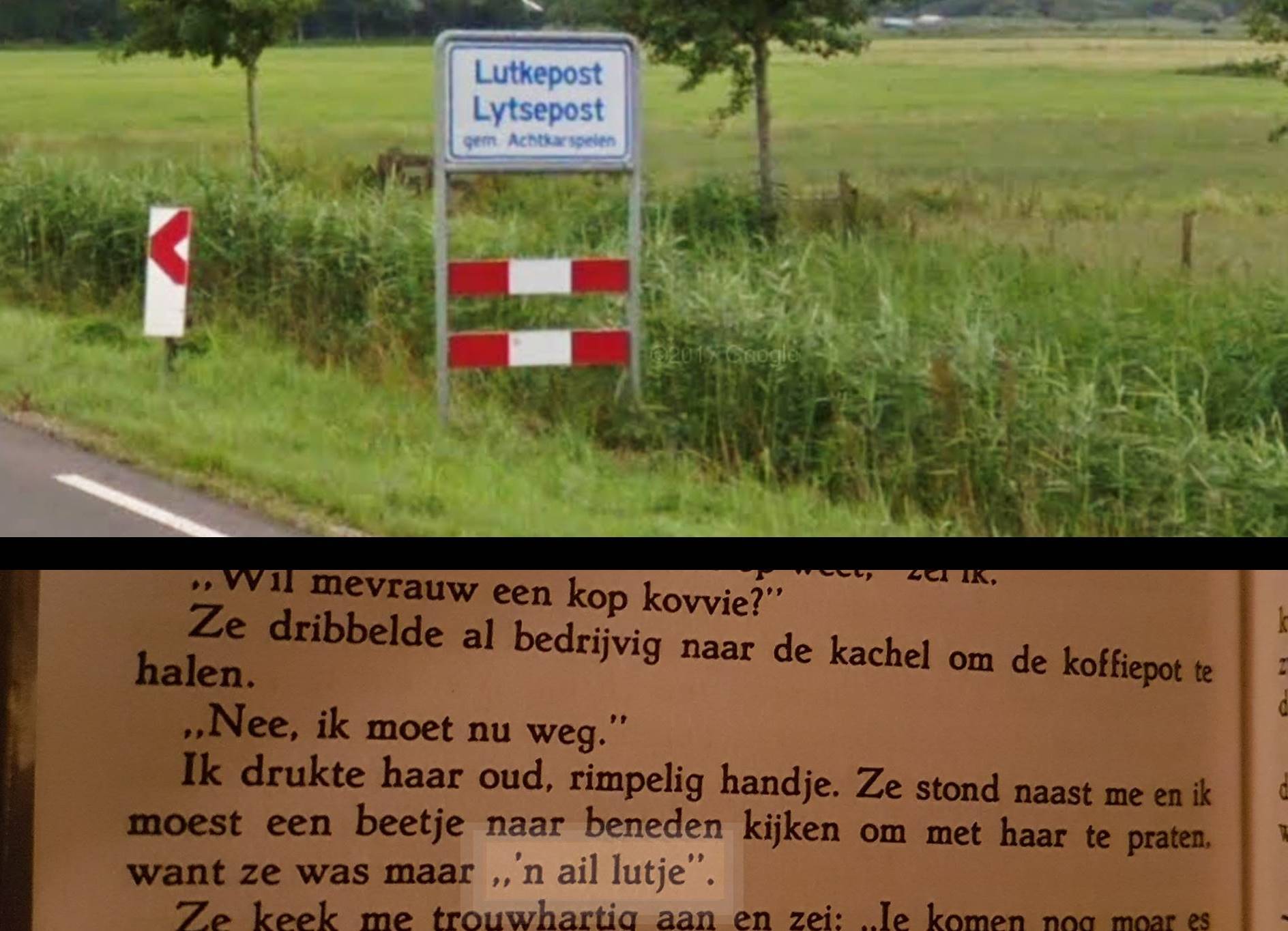WEST GERMANIC
Lützel, luttel, lutje, lyts and little
Linguistics
| 20-12-2019
Near Buitenpost, between Leeuwarden and Groningen, lies the hamlet Lutkepost. As with several towns in Friesland, the place-name is also in Frisian on the place-name sign: Lytsepost. Lutke didn't say much to me, but lytse díd sound familiar. All of a sudden all kinds of puzzle pieces fell into place.
From Lutkepost to little
Before I came to live in Friesland, I had heard of places like Luttelgeest and Lutjebroek, but I had never really thought about it the meaning of those place names. When I learned Frisian, I found it striking that lyts is a very different word from the Dutch translation klein (small in English), but I did not make a link with other languages at that time. Until at a certain point we drove to Groningen avoiding the highway and I saw that sign with Lutkepost / Lytsepost. If Lutke can be translated with Lytse, it probably also means 'small'. Quite logical, because luttel - as in 'luttele seconden' ('a few seconds') - also means 'small' or 'little'. And now that I think about it; that luttel is very similar to the English little. This raises the question why we use klein in Dutch and German. While I was wondering about that, we now drove past Augsbuurt Lytsewâld, or Augsbuurt-Lutjewoude.

Luttel and lützel
While writing articles for this blog, I have noticed more often that words that are outdated or no longer appear in general Dutch, are still used in regional language and in Frisian. That also seems to apply more or less to the word luttel. Where that word is now only used in fixed collocations, it was originally noun as well as adjective, adverb and numeral. The EWN states that luttel was outdated in the New Dutch period and replaced by synonyms such as klein, gering, weinig and zelden. We see the same in German. There, lützel was gradually replaced after the 17th century by words such as klein, gering, wenig and selten. So here, too, Dutch and German run parallel, while Frisian and English go a different way. Furthermore, the DWDS lets us know that in the North German speaking area the Low German lütt occurs. Low German is "the collective name for a number of West Germanic dialects spoken in northern Germany and northern and eastern Netherlands that have not participated in the High German consonant shift," says the Dutch Wikipedia. That consonant shift took place well before the 17th century, but apparently Low German was also less susceptible to language changes in other areas than the High German, the current standard language of Germany.
Little, littler, littlest
The origin of luttel, lützel, lyts and little is not entirely clear. Moreover, the EWN says that there are no well-comparable words outside of Germanic. It could be that the words are a remnant of a language spoken in Northwestern Europe even before the Indo-European languages came this way. Of course there are no written sources of that and sound recordings were far from being known at that time, so we will never know for sure. What we do know, and what I consider to be a fun fact, is that in English the comparative forms of little previously weren't less and least, but littler and littlest. I think those are much more obvious forms. You'd think that the 'illogical' forms would be displaced over time by more transparent variants, but apparently languages do not always develop so efficiently. Linguistics is therefore not an exact science. But that makes it all the more fascinating. All right, one more fun fact: Letzenburg, which we call Luxemburg in Dutch, means "small city". This contrasted with Mecklenburg, literally "big city". We also have the same kind of contrast in the Netherlands, where Lutjebroek lies next to Grootebroek.
From Lutkepost to little
Before I came to live in Friesland, I had heard of places like Luttelgeest and Lutjebroek, but I had never really thought about it the meaning of those place names. When I learned Frisian, I found it striking that lyts is a very different word from the Dutch translation klein (small in English), but I did not make a link with other languages at that time. Until at a certain point we drove to Groningen avoiding the highway and I saw that sign with Lutkepost / Lytsepost. If Lutke can be translated with Lytse, it probably also means 'small'. Quite logical, because luttel - as in 'luttele seconden' ('a few seconds') - also means 'small' or 'little'. And now that I think about it; that luttel is very similar to the English little. This raises the question why we use klein in Dutch and German. While I was wondering about that, we now drove past Augsbuurt Lytsewâld, or Augsbuurt-Lutjewoude.

Place-name sign Lutkepost/Lytsepost and a fragment from Een Groninger pastorie in de storm, translated into English as House of defiance
Lutjepotje The fact that Lutjewoude is slightly closer to the Frisian border with the province of Groningen than Lutkepost, is also interesting to me. The diminutive suffix '-ke' is common in Frisian, while lutje is how it is said in the Groningen regional language. Not that I speak that dialect fluently, on the contrary even, but in the book Een Groninger pastorie in de storm by J.A Ader-Appels (the mother of Bas Jan Ader, which is why I read the book) the word lutje is used a few times, for example in the fragment on the photo. I also came across the term 'lutje potje' in that book. From the sentence it seemed to mean something like 'little child' to me, but on the Dutch Wikipedia I saw that 'lutjepotje' is Groningen's dialect for a babyhuisje, a "little wooden house where young children can sleep outside during the day". I can't find the sentence in the book again to see if that meaning fits in the sentence, but maybe a 'lutje potje' is something else than a 'lutjepotje'.Luttel and lützel
While writing articles for this blog, I have noticed more often that words that are outdated or no longer appear in general Dutch, are still used in regional language and in Frisian. That also seems to apply more or less to the word luttel. Where that word is now only used in fixed collocations, it was originally noun as well as adjective, adverb and numeral. The EWN states that luttel was outdated in the New Dutch period and replaced by synonyms such as klein, gering, weinig and zelden. We see the same in German. There, lützel was gradually replaced after the 17th century by words such as klein, gering, wenig and selten. So here, too, Dutch and German run parallel, while Frisian and English go a different way. Furthermore, the DWDS lets us know that in the North German speaking area the Low German lütt occurs. Low German is "the collective name for a number of West Germanic dialects spoken in northern Germany and northern and eastern Netherlands that have not participated in the High German consonant shift," says the Dutch Wikipedia. That consonant shift took place well before the 17th century, but apparently Low German was also less susceptible to language changes in other areas than the High German, the current standard language of Germany.
Little, littler, littlest
The origin of luttel, lützel, lyts and little is not entirely clear. Moreover, the EWN says that there are no well-comparable words outside of Germanic. It could be that the words are a remnant of a language spoken in Northwestern Europe even before the Indo-European languages came this way. Of course there are no written sources of that and sound recordings were far from being known at that time, so we will never know for sure. What we do know, and what I consider to be a fun fact, is that in English the comparative forms of little previously weren't less and least, but littler and littlest. I think those are much more obvious forms. You'd think that the 'illogical' forms would be displaced over time by more transparent variants, but apparently languages do not always develop so efficiently. Linguistics is therefore not an exact science. But that makes it all the more fascinating. All right, one more fun fact: Letzenburg, which we call Luxemburg in Dutch, means "small city". This contrasted with Mecklenburg, literally "big city". We also have the same kind of contrast in the Netherlands, where Lutjebroek lies next to Grootebroek.
WEST GERMANIC
In the West Germanic section every other week I discuss a word that strikes me. I look at the meanings and forms of the word, and especially at where the word originates from. With that I compare the four West Germanic languages Dutch, English, Frisian and German, with the occasional inevitable trip across the fictional West Germanic border.
In the next episode: Gers gerskje
Sources
Most sources are indicated in the text as a link.
- Image place name sign: Google Maps
- Image book fragment: Ader-Appels, J.A. (1990). Een Groninger pastorie in de storm. Franeker: Van Wijnen
